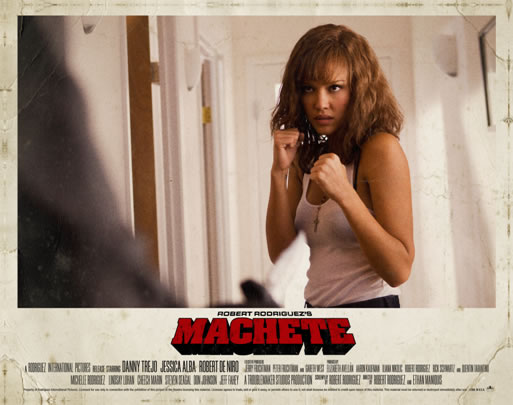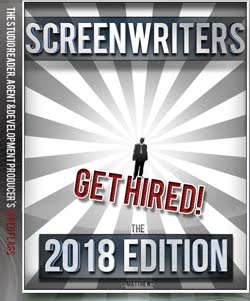When ex-Federale turned Texas day laborer Machete /Danny Trejo becomes the fall guy for a crooked political assassination attempt, he finds a web of corruption and deceit that spreads so deep that he needs help to take it down. Helping Machete even the odds are Luz /Michelle Rodriguez, a sexy taco truck lady who is a revolutionary at heart, and I.C.E. Agent Sartana /Jessica Alba , a beautiful and street-savvy woman who realizes that things aren’t what they first appear when it comes to this bad-ass.
At a press conference for the film, co-stars Michelle Rodriguez and Jessica Alba talked about what it’s like to have a movie like this released while immigration is such an important issue for people, what makes Danny Trejo such a compelling leading man and finally putting stilettos to some good use.
Question: Michelle, you’ve played a lot of bad-ass characters in your career, but what did it mean to you to play a Mexican bad-ass in a Robert Rodriguez movie?
Michelle: It was like, “Holy schnap, about time!” I’ve always wanted to work with him. He’s a cool cat. There’s only a handful of directors who really understand what I call the alchemical balance between a man and a woman, in a woman’s body, which most people consider the strong woman character. Not many people understand how to balance that out properly, so that she’s sexy and kicks ass. He gets it, so I’ve always wanted to work with him. Hands down, he calls me up and I’m just like, “Yep, I’m in!”
Is there a special cultural significance of being a part of something like this?
Michelle: Yeah. It’s rough because there’s a massive, almost inevitable footprint from the African American community impacting the film industry, since the beginning of film, and impacting the music industry, since the beginning of music in this country. I feel like the imprint that the Latin community has made, culturally, throughout the years, is grey. We can’t really put a massive stamp and say, “Oh, my god, this really expresses what it’s like to be American and Latin!” It’s all drug dealers or maids, or Rita Moreno in West Side Story. Jennifer Lopez is the closest we’ve come. Jessica and I are part of that movement. For me, personally and culturally, it’s like saying to our own Latin community, “Listen, there’s a massive voice of American Latinos that are different from your culture and we need a voice, so let’s start making some movies.” I just really appreciate that Robert has been around to make that impact. Robert has really been a big part of sharing the happy voice with the world. I feel like the grand majority of the time that there’s a voice, it’s a sad story about something important that happened. Sometimes you just want to have fun, and where are those movies?
Everyone in the movie who is anti-illegal immigration, turns out to have an ulterior motive, or even changes their mind. Do you think that reflects the current political climate?
Jessica: I think it’s about education and knowledge. When you start questioning authority, government, rules and laws, and digging beyond the rhetoric, you discover your own opinion and stance, and this movie is about that. It’s about not judging a book by its cover, having your own opinion and voice, and hopefully connecting with humanity instead of picking a political side.
Michelle, what was it like to shoot a scene with Robert DeNiro?
Michelle: I wish! I was shooting Battle: Los Angeles, so we actually shot in different locations on different dates. I was so pissed. I was like, “Dude, come on! Seriously? For this one little scene, you’re going to keep me here in Louisiana, when I could be in Austin shooting with DeNiro?” (Producer) Neal [Moritz] didn’t move it around, so whatever. It’s all good. But, I still love DeNiro.
Jessica, how did it feel to finally put some stilettos to good use?
Jessica: Aside from just killing our feet.
Michelle: I love that scene. That was hot! It was so cool.
Jessica: Walking on them wasn’t as fun as putting them in someone’s eye, that’s for sure. They were 3″, so they looked much higher than they were. Robert knows how to put the camera low to make you look longer than you actually are, so that was good. They were 3″, so they weren’t too high, but they weren’t that comfortable, especially in 104 degrees in Austin, Texas.
Can you talk about any deleted scenes that you guys shot, that could make the extended cut on the DVD?
Jessica: I wonder what Robert is going to throw in there. That could be interesting.
Michelle: Yeah, I’m sure that’s going to be fun.
Jessica: I think we should just wait for it to come out. You take a leap of faith with Robert, as an artist and as an actress, and you trust him, knowing that he’s going to put it together a certain way. We’ll just see what happens.
What’s it like for you to have this movie released in this current political climate and be asked about your political views?
Michelle: I personally find it to be extraordinarily fun because of the fact that you can get away with so much, with a comedy or an exploitation film. It doesn’t matter that this person said that derogatory term, or this person really feels that Latin people should all die or be murdered. It’s an exploitation film, where a guy swings off of another person’s intestine into a building, so it’s totally okay. But, at the end of the day, those words said by both parties – the Latin community and the American Hick individuals in the script – will resonate with you, when you walk out of the theater because they are real opinions from real people, it’s just exaggerated in an exploitative film. At least, if anybody leaves with anything, it’s the acknowledgment that we’re living in a society where people still are judgmental idiots and this film really feeds off of that, like no tomorrow.

Jessica: I also think it’s exciting, for us as artists. Usually, we’re just entertaining and, most of the time, everything is just pure, commercial entertainment. Especially in Hollywood, there isn’t a whole lot of emphasis on much else. Film is used, in other places in the world, for political messages, and it’s an art, in all different forms. Some people don’t have a voice, and their government keeps them from having a voice. Knowing that we can participate in something that is socially and politically relevant, even in one of the biggest pop culture makers of the world – Hollywood – that’s awesome.
What makes Danny Trejo such a compelling leading man?
Michelle: He’s a sweetheart. That guys heart could attract a thousand women, I’m sure. There is something about him, as a person, that is just very innocent and sweet, even though it may not seem that way, in appearance. I could see, in his youth, that he probably attracted a lot of women. It’s the face. It’s so rough, it looks so weathered and it looks like he’s been through so much that it would put you off, but when you look in his eyes, you see this innocence and you’re just like, “Oh, okay, it’s okay to lay on this guy’s chest and hold him. It’s all right to be around him. He’s not going to attack you.”
Were there any big differences between the script you guys read and the final product you saw? Was there anything in the final film that really shocked or stunned you?
Jessica: There’s a lot less in there.
Michelle: I think you’ll really be surprised when you see the DVD. I knew, from the jump, that there was going to be some crazy-ass stuff. The beginning was really surprising. I wasn’t expecting that cell phone thing. There are definite moments, especially after the special effects were added with the sound.
Jessica: It’s one thing to read it, and another thing to watch it.
Michelle: It was pretty intense.
Michelle, was there any difference in doing the action scenes wearing the eye patch?
Michelle: No. Do you use both eyes to create depth perception? I still had a little depth perception with one eye. Maybe if you covered my ears too, I might get a little groggy and not know where I am, and maybe my depth perception would be hurt, at that point. No, it didn’t affect me. It was pretty cool. The hearing made up for whatever covering one eye did.
At one point in the film, Machete says that he wanted to shoot the Senator in the neck so that he will stop saying stupid things. Who do you wish would stop saying stupid things?
Michelle: Gosh, all ignorant people on the planet who don’t know how to love. They should all stop saying stupid things. They should all just get shot in the throat. That would be great! I think I summed it all up with that one.
Would you consider doing sequels for this, or a spin-off for She?
Michelle: Heck yeah, in a heartbeat! I love working with Robert. He’s awesome.
Jessica: The same, of course.
Michelle, Avatar is being released again with some new scenes in it. Will there be any new scenes with you?
Michelle: I don’t know exactly. It was shooting for four years and they had a four-hour film that they cut down. You’re definitely going to get a lot more than what the first one was. There was a lot more that they shot. Forget about it, it was the film that never ended. I’m sure it’s still going. They’re still shooting somewhere.
Jessica, you’ve done both action and comedy work. Do you prefer one over the other?
Jessica: I love doing both. I have always had a soft spot for action. I basically started my adult career doing a TV show (Dark Angel) that Jim Cameron produced. He’s another one that knows how to write strong women. That’s where I started, so I always love that, but comedy is why I started acting, in the first place. I love both.
Have you heard any word on what’s going on with the third Fantastic 4 film?
Jessica: I don’t know. But, I’m in The Little Fockers, which is number 3.
source [collider]



















